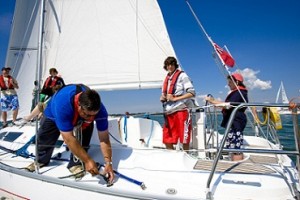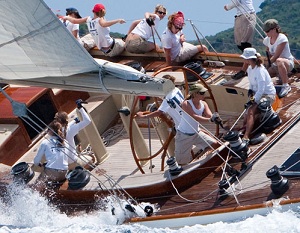There really are few limits when it comes to sailing, provided of course that a sailor has the necessary qualifications for what they plan to do.
Developing as a sailor requires plenty of time out on the water to gain experience, during which time it should be possible to learn to sail while mastering all of the basics.
This includes aspects such as basic navigation and boat control, the key elements required to manage a vessel in both closed and open water.
In addition to this, it is recommended that sailors undertake appropriate safety training and first aid courses to ensure they can cope with any eventuality.
This helps to mitigate some of the risks associated with sailing – while these risks cannot be completely eradicated they can at least be managed to improve levels of safety.
Once the basics are mastered and a suitable degree of experience has been built up, aspiring skippers can then think about completing day skipper courses.

These courses provide the experience of taking control of a vessel, although an instructor will be present to make sure everyone remains safe.
It means a sailor can learn about what to do in a number of situations, enabling them to take credit when things go well, but also to be held responsible when they don’t.
A RYA day skipper course will also help to develop the skills needed to sail in various weather conditions and to understand the impacts of tides on sailing experience.
The key aspects to come from the course will be pilotage skills, route planning, boat handling and what to do in an emergency situation.
Courses are carried out with qualified instructors, who have the necessary experience and patience to deal with those learning their way.
Once complete, these skills will enable a sailor to tackle nearly any stretch of water and will supply them with the required certificates to skipper a vessel.
An International Certificate of Competence, required in most European countries to own or charter a boat, can be applied for upon completion of most courses.
Essentially, these sailing courses provide the skills required for an individual to take charge in a safe and responsible fashion.
Sailors undertaking a day skipper course should have a significant level of experience already under their belts, usually including a minimum of five days spent sailing and living on board a vessel.
Furthermore, they should have logged 100 miles on the water and have spent at least four hours sailing at night.
This means they have seen the various conditions that a sailor must face, while potential day skippers should also have a comprehensive understanding of the theory behind the practice.
It is also expected that anyone undertaking a course will devote their efforts towards it and everything that it involves.

Completing a Day Skipper course is the first step towards a career in commercial boating, although further training, experience and certificates are required before a sailor can legally do that.
A Professional Practices and Responsibilities course is required for commercial endorsement and a great deal of experience is required before this can be undertaken.
This opens up many possibilities for careers involving waterways, from large commercial shipping to roles on land related to boats.
Further courses such as yachtmaster training could be one consideration, while alternative vessels could also be used, such as powerboat training.
Learning to sail is a constant process of development and requires solid foundations from which to begin.
RYA sailing courses offer a starting point, while day skipper courses merely add to those basic skills to develop sailors that can cope with any situation.